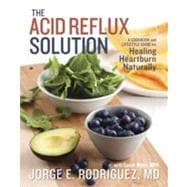
What is included with this book?
| Acknowledgments | p. vii |
| Introduction: I Feel Your Pain | p. 1 |
| The Acid Reflux Solution | |
| Acid Reflux Nation: You Are Not Alone | p. 9 |
| Close the Medicine Cabinet: More Is Not Always Better | p. 15 |
| The Acid Reflux Solution: How to Alleviate GERD Naturally | p. 21 |
| WhatÆs on the Menu?: More Than You Think | p. 33 |
| Everyone Is Special: Making the Acid Reflux Solution Work for You | p. 47 |
| Weighty Matters: How to Eat Well (and Lose Weight) on This Program | p. 53 |
| The Recipes | |
| Appetizers and Snacks | p. 62 |
| Soups | p. 79 |
| Salads | p. 93 |
| Seafood | p. 112 |
| Poultry and Meats | p. 127 |
| Pasta, Rice, and Beans | p. 145 |
| Vegetables and Grains | p. 163 |
| Desserts | p. 180 |
| Appendix: Medical Technology to the Rescue | p. 195 |
| Bibliography | p. 201 |
| About the Authors | p. 205 |
| Measurement Conversion Charts | p. 206 |
| Index | p. 207 |
| Table of Contents provided by Ingram. All Rights Reserved. |
The New copy of this book will include any supplemental materials advertised. Please check the title of the book to determine if it should include any access cards, study guides, lab manuals, CDs, etc.
The Used, Rental and eBook copies of this book are not guaranteed to include any supplemental materials. Typically, only the book itself is included. This is true even if the title states it includes any access cards, study guides, lab manuals, CDs, etc.